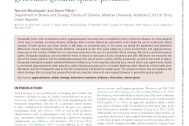Obsah
Personality traits, such as boldness and/or aggressiveness, have long been accepted to have a profound influence on many aspects of the lives of animals, including foraging. However, little is known about how personality traits shape the use of a particular attack strategy. Ground spiders use either venom or silk attack to immobilize prey. In this study, we tested the hypothesis that behavioral differences among individuals (namely boldness, measured as the time spent exploring a novel environment
and aggressiveness, measured as the number of killed but not consumed prey) drive the use of a particular attack strategy. We used a generalist ground spider, Drassodes lapidosus, and recorded the mode of attack on two types of prey, dangerous and safe. Moreover, we measured the size of the venom gland to test the relationship between the size of venom volume and the personality, as well as the mode of attack. Drassodes individuals showed consistent behavioral differences in the way they attacked prey. Venom attack was significantly related to increased aggressiveness when attacking spider (dangerous) prey and to increased boldness when attacking cricket (safe) prey. Silk attack was more frequently used by shy (for cricket prey) and docile (for spider prey). The volume of venom was not related to the attack strategy. We conclude that personality traits are important drivers of prey-capture behavior in generalist ground spiders.



